#government privatization
Photo
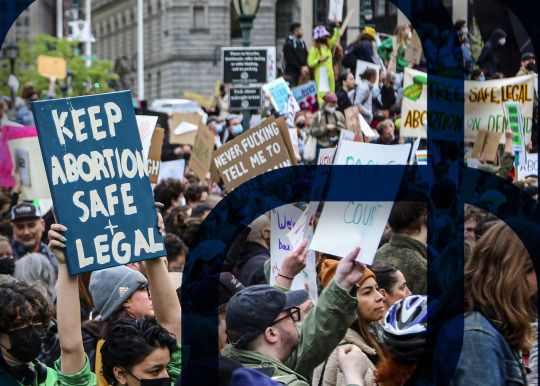
U.S. Marshalls Spied on Abortion Protesters Using DATAMINR >
Twitter’s “official partner” monitored the precise time and location of post-Roe demonstrations, internal emails show.
DATAMINR, AN “OFFICIAL PARTNER” of Twitter, alerted a federal law enforcement agency to pro-abortion protests and rallies in the wake of the reversal of Roe v. Wade, according to documents obtained by The Intercept through a Freedom of Information Act request.
Internal emails show that the U.S. Marshals Service received regular alerts from Dataminr, a company that persistently monitors social media for corporate and government clients, about the precise time and location of both ongoing and planned abortion rights demonstrations. The emails show that Dataminr flagged the social media posts of protest organizers, participants, and bystanders, and leveraged Dataminr’s privileged access to the so-called firehose of unrestricted Twitter data to monitor constitutionally protected speech.
[Sam Biddle, The Intercept, May 15 2023]
#twitter#elon musk#musk#social media#abortion#roe v wade#roe vs wade#abortion rights#pro-abortion#abortion access#healthcare#body autonomy#supreme court#politics#us politics#us government#privacy policy#privacy#datamining#data for sale#government privatization#policing#surveillance#free speech#right of assembly#corporate spying#protest#demonstration#activism#activists
19 notes
·
View notes
Text
Al coming back from his travels: Xing was great! I've learned so much about alkahestry, and I think we're really making progress and getting Jerso and Zampano's bodies back! It was really nice to see Mei, and Ling is doing a great job as emperor, and I even got to visit some of Xing's neighbors to the east! I feel like I'm learning more about alchemy and alkahestry every day
Ed coming back from his travels: I Have Been Banned From Five Countries
#fma#blatantly stealing this joke from my sibling because it made me laugh so hard on our call#fmab#alphonse elric#edward elric#even without his alchemy and military rank ed still manages to cause trouble wherever he goes#roy calling on a private line: edward if you cause another international incident i swear to god I am putting you on house arrest#ed minutes away from breaking into a government building in creta: I'd like to see you try#al accomplishes so much and ed is very proud of him but unfortunately ed is fundamentally a gremlin that is a magnet for trouble#fma posting
3K notes
·
View notes
Text
It always angers me when people say that men would not put in so much effort to enact their violence on women and children because they do exactly that.
I was only seven when I learnt about just how hard men try to deceive the world so they can have free reign over young girls. I went on a Brownie trip to an orphanage back when I lived in Nigeria. The orphanage was just for girls which isn't uncommon, and it was massive, with its own school, shops, clinic etc. The girls had no reason to leave. It was set up by a pastor- a Nigerian who'd moved back from abroad.
I remember while we were there, one of the girls had just had a baby. She had seemed so old to me but looking back, she must have been around sixteen or seventeen. I remember my mum seemed suspicious when we were told the girl had run away and returned pregnant. She seemed even more so when we met the owner.
A year or two later, there was news on the radio. The man who had set up the orphanage had raped and impregnated several girls, selling their babies to prospective parents. I didn't even understand what rape meant back then but I remember my mum being devastated. Looking back, I think she might have felt guilty, perhaps she'd seen the signs: the girls not being allowed to leave the compound; teenage girls ending up pregnant. It seemed so obvious.
But no one questioned a man who used all of his money to build and set up a home for vulnerable girls, he was a pastor, educated, well-travelled. He could never have done something so cruel. But he did.
When I was writing this post, I tried to find any articles but I couldn't. They were just so many identical cases, man sets up orphanage, rapes and abuses children in the orphanage. Different cases, different years, one as recent as 2023. What I learnt back then and know for sure is that men would do anything, no matter how difficult or expensive, anything to have access to people they can abuse.
#feminism#radfem#radical feminist#radical feminism#radblr#radfems please interact#radical feminist safe#radical feminists do interact#i think another point is how easy it is to set up private homes in nigeria#orphanges care homes nursing homes#as long as you have money and friends in the government#there is such little safe guarding#boarding houses as well because boarding is very common#the staff employed is not thoroughly checked and even the owners too aren't
747 notes
·
View notes
Text
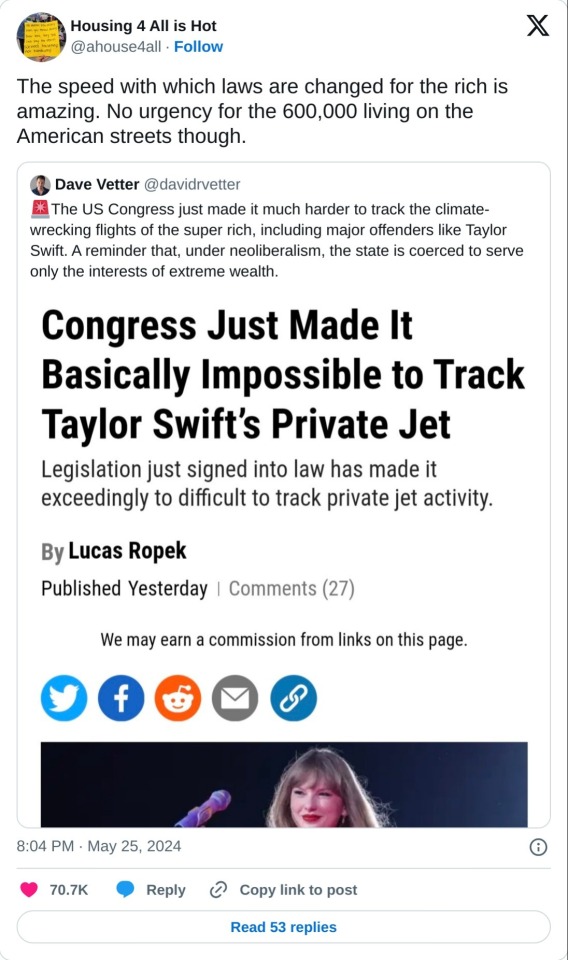
#no accountability#of course ultra rich climate criminals can get away with it#the government for the ultra rich and by the ultra rich#congress serves the powerful and ignores the suffering of the poor#taylor swift#taylorswift#ttpd#the tortured poets department#private jet#billionaire#climate crisis#climate change#environmentalism#environment#political activist#activism#miss americana#carbon emissions#carbon footprint
171 notes
·
View notes
Text
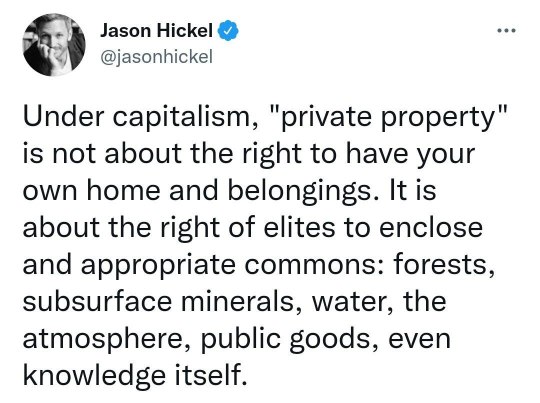
#ausgov#politas#society#community#earth#capitalism#fascism#private property#auspol#tasgov#taspol#australia#fuck neoliberals#neoliberal capitalism#anthony albanese#albanese government#random facts#interesting facts#fun facts#charlie and the chocolate factory#jack facts#facts#fact#eat the rich#eat the fucking rich#anti capitalist#washington capitals#capitalist hell#capitalist dystopia#capitalist bullshit
119 notes
·
View notes
Text
In defense of bureaucratic competence

Sure, sometimes it really does make sense to do your own research. There's times when you really do need to take personal responsibility for the way things are going. But there's limits. We live in a highly technical world, in which hundreds of esoteric, potentially lethal factors impinge on your life every day.
You can't "do your own research" to figure out whether all that stuff is safe and sound. Sure, you might be able to figure out whether a contractor's assurances about a new steel joist for your ceiling are credible, but after you do that, are you also going to independently audit the software in your car's antilock brakes?
How about the nutritional claims on your food and the sanitary conditions in the industrial kitchen it came out of? If those turn out to be inadequate, are you going to be able to validate the medical advice you get in the ER when you show up at 3AM with cholera? While you're trying to figure out the #HIPAAWaiver they stuck in your hand on the way in?
40 years ago, Ronald Reagan declared war on "the administrative state," and "government bureaucrats" have been the favored bogeyman of the American right ever since. Even if Steve Bannon hasn't managed to get you to froth about the "Deep State," there's a good chance that you've griped about red tape from time to time.
Not without reason, mind you. The fact that the government can make good rules doesn't mean it will. When we redid our kitchen this year, the city inspector added a bunch of arbitrary electrical outlets to the contractor's plans in places where neither we, nor any future owner, will every need them.
But the answer to bad regulation isn't no regulation. During the same kitchen reno, our contractor discovered that at some earlier time, someone had installed our kitchen windows without the accompanying vapor-barriers. In the decades since, the entire structure of our kitchen walls had rotted out. Not only was the entire front of our house one good earthquake away from collapsing – there were two half rotted verticals supporting the whole thing – but replacing the rotted walls added more than $10k to the project.
In other words, the problem isn't too much regulation, it's the wrong regulation. I want our city inspectors to make sure that contractors install vapor barriers, but to not demand superfluous electrical outlets.
Which raises the question: where do regulations come from? How do we get them right?
Regulation is, first and foremost, a truth-seeking exercise. There will never be one obvious answer to any sufficiently technical question. "Should this window have a vapor barrier?" is actually a complex question, needing to account for different window designs, different kinds of barriers, etc.
To make a regulation, regulators ask experts to weigh in. At the federal level, expert agencies like the DoT or the FCC or HHS will hold a "Notice of Inquiry," which is a way to say, "Hey, should we do something about this? If so, what should we do?"
Anyone can weigh in on these: independent technical experts, academics, large companies, lobbyists, industry associations, members of the public, hobbyist groups, and swivel-eyed loons. This produces a record from which the regulator crafts a draft regulation, which is published in something called a "Notice of Proposed Rulemaking."
The NPRM process looks a lot like the NOI process: the regulator publishes the rule, the public weighs in for a couple of rounds of comments, and the regulator then makes the rule (this is the federal process; state regulation and local ordinances vary, but they follow a similar template of collecting info, making a proposal, collecting feedback and finalizing the proposal).
These truth-seeking exercises need good input. Even very competent regulators won't know everything, and even the strongest theoretical foundation needs some evidence from the field. It's one thing to say, "Here's how your antilock braking software should work," but you also need to hear from mechanics who service cars, manufacturers, infosec specialists and drivers.
These people will disagree with each other, for good reasons and for bad ones. Some will be sincere but wrong. Some will want to make sure that their products or services are required – or that their competitors' products and services are prohibited.
It's the regulator's job to sort through these claims. But they don't have to go it alone: in an ideal world, the wrong people will be corrected by other parties in the docket, who will back up their claims with evidence.
So when the FCC proposes a Net Neutrality rule, the monopoly telcos and cable operators will pile in and insist that this is technically impossible, that there is no way to operate a functional ISP if the network management can't discriminate against traffic that is less profitable to the carrier. Now, this unity of perspective might reflect a bedrock truth ("Net Neutrality can't work") or a monopolists' convenient lie ("Net Neutrality is less profitable for us").
In a competitive market, there'd be lots of counterclaims with evidence from rivals: "Of course Net Neutrality is feasible, and here are our server logs to prove it!" But in a monopolized markets, those counterclaims come from micro-scale ISPs, or academics, or activists, or subscribers. These counterclaims are easy to dismiss ("what do you know about supporting 100 million users?"). That's doubly true when the regulator is motivated to give the monopolists what they want – either because they are hoping for a job in the industry after they quit government service, or because they came out of industry and plan to go back to it.
To make things worse, when an industry is heavily concentrated, it's easy for members of the ruling cartel – and their backers in government – to claim that the only people who truly understand the industry are its top insiders. Seen in that light, putting an industry veteran in charge of the industry's regulator isn't corrupt – it's sensible.
All of this leads to regulatory capture – when a regulator starts defending an industry from the public interest, instead of defending the public from the industry. The term "regulatory capture" has a checkered history. It comes out of a bizarre, far-right Chicago School ideology called "Public Choice Theory," whose goal is to eliminate regulation, not fix it.
In Public Choice Theory, the biggest companies in an industry have the strongest interest in capturing the regulator, and they will work harder – and have more resources – than anyone else, be they members of the public, workers, or smaller rivals. This inevitably leads to capture, where the state becomes an arm of the dominant companies, wielded by them to prevent competition:
https://pluralistic.net/2022/06/05/regulatory-capture/
This is regulatory nihilism. It supposes that the only reason you weren't killed by your dinner, or your antilock brakes, or your collapsing roof, is that you just got lucky – and not because we have actual, good, sound regulations that use evidence to protect us from the endless lethal risks we face. These nihilists suppose that making good regulation is either a myth – like ancient Egyptian sorcery – or a lost art – like the secret to embalming Pharaohs.
But it's clearly possible to make good regulations – especially if you don't allow companies to form monopolies or cartels. What's more, failing to make public regulations isn't the same as getting rid of regulation. In the absence of public regulation, we get private regulation, run by companies themselves.
Think of Amazon. For decades, the DoJ and FTC sat idly by while Amazon assembled and fortified its monopoly. Today, Amazon is the de facto e-commerce regulator. The company charges its independent sellers 45-51% in junk fees to sell on the platform, including $31b/year in "advertising" to determine who gets top billing in your searches. Vendors raise their Amazon prices in order to stay profitable in the face of these massive fees, and if they don't raise their prices at every other store and site, Amazon downranks them to oblivion, putting them out of business.
This is the crux of the FTC's case against Amazon: that they are picking winners and setting prices across the entire economy, including at every other retailer:
https://pluralistic.net/2023/04/25/greedflation/#commissar-bezos
The same is true for Google/Facebook, who decide which news and views you encounter; for Apple/Google, who decide which apps you can use, and so on. The choice is never "government regulation" or "no regulation" – it's always "government regulation" or "corporate regulation." You either live by rules made in public by democratically accountable bureaucrats, or rules made in private by shareholder-accountable executives.
You just can't solve this by "voting with your wallet." Think about the problem of robocalls. Nobody likes these spam calls, and worse, they're a vector for all kinds of fraud. Robocalls are mostly a problem with federation. The phone system is a network-of-networks, and your carrier is interconnected with carriers all over the world, sometimes through intermediaries that make it hard to know which network a call originates on.
Some of these carriers are spam-friendly. They make money by selling access to spammers and scammers. Others don't like spam, but they have lax or inadequate security measures to prevent robocalls. Others will simply be targets of opportunity: so large and well-resourced that they are irresistible to bad actors, who continuously probe their defenses and exploit overlooked flaws, which are quickly patched.
To stem the robocall tide, your phone company will have to block calls from bad actors, put sloppy or lazy carriers on notice to shape up or face blocks, and also tell the difference between good companies and bad ones.
There's no way you can figure this out on your own. How can you know whether your carrier is doing a good job at this? And even if your carrier wants to do this, only the largest, most powerful companies can manage it. Rogue carriers won't give a damn if some tiny micro-phone-company threatens them with a block if they don't shape up.
This is something that a large, powerful government agency is best suited to addressing. And thankfully, we have such an agency. Two years ago, the FCC demanded that phone companies submit plans for "robocall mitigation." Now, it's taking action:
https://arstechnica.com/tech-policy/2023/10/telcos-filed-blank-robocall-plans-with-fcc-and-got-away-with-it-for-2-years/
Specifically, the FCC has identified carriers – in the US and abroad – with deficient plans. Some of these plans are very deficient. National Cloud Communications of Texas sent the FCC a Windows Printer Test Page. Evernex (Pakistan) sent the FCC its "taxpayer profile inquiry" from a Pakistani state website. Viettel (Vietnam) sent in a slide presentation entitled "Making Smart Cities Vision a Reality." Canada's Humbolt VoIP sent an "indiscernible object." DomainerSuite submitted a blank sheet of paper scrawled with the word "NOTHING."
The FCC has now notified these carriers – and others with less egregious but still deficient submissions – that they have 14 days to fix this or they'll be cut off from the US telephone network.
This is a problem you don't fix with your wallet, but with your ballot. Effective, public-interest-motivated FCC regulators are a political choice. Trump appointed the cartoonishly evil Ajit Pai to run the FCC, and he oversaw a program of neglect and malice. Pai – a former Verizon lawyer – dismantled Net Neutrality after receiving millions of obviously fraudulent comments from stolen identities, lying about it, and then obstructing the NY Attorney General's investigation into the matter:
https://pluralistic.net/2021/08/31/and-drown-it/#starve-the-beast
The Biden administration has a much better FCC – though not as good as it could be, thanks to Biden hanging Gigi Sohn out to dry in the face of a homophobic smear campaign that ultimately led one of the best qualified nominees for FCC commissioner to walk away from the process:
https://pluralistic.net/2022/12/15/useful-idiotsuseful-idiots/#unrequited-love
Notwithstanding the tragic loss of Sohn's leadership in this vital agency, Biden's FCC – and its action on robocalls – illustrates the value of elections won with ballots, not wallets.
Self-regulation without state regulation inevitably devolves into farce. We're a quarter of a century into the commercial internet and the US still doesn't have a modern federal privacy law. The closest we've come is a disclosure rule, where companies can make up any policy they want, provided they describe it to you.
It doesn't take a genius to figure out how to cheat on this regulation. It's so simple, even a Meta lawyer can figure it out – which is why the Meta Quest VR headset has a privacy policy isn't merely awful, but long.
It will take you five hours to read the whole document and discover how badly you're being screwed. Go ahead, "do your own research":
https://foundation.mozilla.org/en/privacynotincluded/articles/annual-creep-o-meter/
The answer to bad regulation is good regulation, and the answer to incompetent regulators is competent ones. As Michael Lewis's Fifth Risk (published after Trump filled the administrative agencies with bootlickers, sociopaths and crooks) documented, these jobs demand competence:
https://memex.craphound.com/2018/11/27/the-fifth-risk-michael-lewis-explains-how-the-deep-state-is-just-nerds-versus-grifters/
For example, Lewis describes how a Washington State nuclear waste facility created as part of the Manhattan Project endangers the Columbia River, the source of 8 million Americans' drinking water. The nuclear waste cleanup is projected to take 100 years and cost 100 billion dollars. With stakes that high, we need competent bureaucrats overseeing the job.
The hacky conservative jokes comparing every government agency to the DMV are not descriptive so much as prescriptive. By slashing funding, imposing miserable working conditions, and demonizing the people who show up for work anyway, neoliberals have chased away many good people, and hamstrung those who stayed.
One of the most inspiring parts of the Biden administration is the large number of extremely competent, extremely principled agency personnel he appointed, and the speed and competence they've brought to their roles, to the great benefit of the American public:
https://pluralistic.net/2022/10/18/administrative-competence/#i-know-stuff
But leaders can only do so much – they also need staff. 40 years of attacks on US state capacity has left the administrative state in tatters, stretched paper-thin. In an excellent article, Noah Smith describes how a starveling American bureaucracy costs the American public a fortune:
https://www.noahpinion.blog/p/america-needs-a-bigger-better-bureaucracy
Even stripped of people and expertise, the US government still needs to get stuff done, so it outsources to nonprofits and consultancies. These are the source of much of the expense and delay in public projects. Take NYC's Second Avenue subway, a notoriously overbudget and late subway extension – "the most expensive mile of subway ever built." Consultants amounted to 20% of its costs, double what France or Italy would have spent. The MTA used to employ 1,600 project managers. Now it has 124 of them, overseeing $20b worth of projects. They hand that money to consultants, and even if they have the expertise to oversee the consultants' spending, they are stretched too thin to do a good job of it:
https://slate.com/business/2023/02/subway-costs-us-europe-public-transit-funds.html
When a public agency lacks competence, it ends up costing the public more. States with highly expert Departments of Transport order better projects, which need fewer changes, which adds up to massive costs savings and superior roads:
https://papers.ssrn.com/sol3/papers.cfm?abstract_id=4522676
Other gaps in US regulation are plugged by nonprofits and citizen groups. Environmental rules like NEPA rely on the public to identify and object to environmental risks in public projects, from solar plants to new apartment complexes. NEPA and its state equivalents empower private actors to sue developers to block projects, even if they satisfy all environmental regulations, leading to years of expensive delay.
The answer to this isn't to dismantle environmental regulations – it's to create a robust expert bureaucracy that can enforce them instead of relying on NIMBYs. This is called "ministerial approval" – when skilled government workers oversee environmental compliance. Predictably, NIMBYs hate ministerial approval.
Which is not to say that there aren't problems with trusting public enforcers to ensure that big companies are following the law. Regulatory capture is real, and the more concentrated an industry is, the greater the risk of capture. We are living in a moment of shocking market concentration, thanks to 40 years of under-regulation:
https://www.openmarketsinstitute.org/learn/monopoly-by-the-numbers
Remember that five-hour privacy policy for a Meta VR headset? One answer to these eye-glazing garbage novellas presented as "privacy policies" is to simply ban certain privacy-invading activities. That way, you can skip the policy, knowing that clicking "I agree" won't expose you to undue risk.
This is the approach that Bennett Cyphers and I argue for in our EFF white-paper, "Privacy Without Monopoly":
https://www.eff.org/wp/interoperability-and-privacy
After all, even the companies that claim to be good for privacy aren't actually very good for privacy. Apple blocked Facebook from spying on iPhone owners, then sneakily turned on their own mass surveillance system, and lied about it:
https://pluralistic.net/2022/11/14/luxury-surveillance/#liar-liar
But as the European experiment with the GDPR has shown, public administrators can't be trusted to have the final word on privacy, because of regulatory capture. Big Tech companies like Google, Apple and Facebook pretend to be headquartered in corporate crime havens like Ireland and Luxembourg, where the regulators decline to enforce the law:
https://pluralistic.net/2023/05/15/finnegans-snooze/#dirty-old-town
It's only because of the GPDR has a private right of action – the right of individuals to sue to enforce their rights – that we're finally seeing the beginning of the end of commercial surveillance in Europe:
https://www.eff.org/deeplinks/2022/07/americans-deserve-more-current-american-data-privacy-protection-act
It's true that NIMBYs can abuse private rights of action, bringing bad faith cases to slow or halt good projects. But just as the answer to bad regulations is good ones, so too is the answer to bad private rights of action good ones. SLAPP laws have shown us how to balance vexatious litigation with the public interest:
https://www.rcfp.org/resources/anti-slapp-laws/
We must get over our reflexive cynicism towards public administration. In my book The Internet Con, I lay out a set of public policy proposals for dismantling Big Tech and putting users back in charge of their digital lives:
https://www.versobooks.com/products/3035-the-internet-con
The most common objection I've heard since publishing the book is, "Sure, Big Tech has enshittified everything great about the internet, but how can we trust the government to fix it?"
We've been conditioned to think that lawmakers are too old, too calcified and too corrupt, to grasp the technical nuances required to regulate the internet. But just because Congress isn't made up of computer scientists, it doesn't mean that they can't pass good laws relating to computers. Congress isn't full of microbiologists, but we still manage to have safe drinking water (most of the time).
You can't just "do the research" or "vote with your wallet" to fix the internet. Bad laws – like the DMCA, which bans most kinds of reverse engineering – can land you in prison just for reconfiguring your own devices to serve you, rather than the shareholders of the companies that made them. You can't fix that yourself – you need a responsive, good, expert, capable government to fix it.
We can have that kind of government. It'll take some doing, because these questions are intrinsically hard to get right even without monopolies trying to capture their regulators. Even a president as flawed as Biden can be pushed into nominating good administrative personnel and taking decisive, progressive action:
https://doctorow.medium.com/joe-biden-is-headed-to-a-uaw-picket-line-in-detroit-f80bd0b372ab?sk=f3abdfd3f26d2f615ad9d2f1839bcc07
Biden may not be doing enough to suit your taste. I'm certainly furious with aspects of his presidency. The point isn't to lionize Biden – it's to point out that even very flawed leaders can be pushed into producing benefit for the American people. Think of how much more we can get if we don't give up on politics but instead demand even better leaders.
My next novel is The Lost Cause, coming out on November 14. It's about a generation of people who've grown up under good government – a historically unprecedented presidency that has passed the laws and made the policies we'll need to save our species and planet from the climate emergency:
https://us.macmillan.com/books/9781250865939/the-lost-cause
The action opens after the pendulum has swung back, with a new far-right presidency and an insurgency led by white nationalist militias and their offshore backers – seagoing anarcho-capitalist billionaires.
In the book, these forces figure out how to turn good regulations against the people they were meant to help. They file hundreds of simultaneous environmental challenges to refugee housing projects across the country, blocking the infill building that is providing homes for the people whose homes have been burned up in wildfires, washed away in floods, or rendered uninhabitable by drought.
I don't want to spoil the book here, but it shows how the protagonists pursue a multipronged defense, mixing direct action, civil disobedience, mass protest, court challenges and political pressure to fight back. What they don't do is give up on state capacity. When the state is corrupted by wreckers, they claw back control, rather than giving up on the idea of a competent and benevolent public system.

If you'd like an essay-formatted version of this post to read or share, here's a link to it on pluralistic.net, my surveillance-free, ad-free, tracker-free blog:
https://pluralistic.net/2023/10/23/getting-stuff-done/#praxis
#pluralistic#nerd harder#private right of action#privacy#robocalls#fcc#administrative competence#noah smith#spam#regulatory capture#public choice theory#nimbyism#the lost cause#the internet con#evidence based policy#small government#transit#praxis#antitrust#trustbusting#monopoly
379 notes
·
View notes
Text
The Penguins except they're human and I gave them lore





Ok hear me out...
The Penguins are a group of top secret military super soldier experiments. They were born in a lab in the arctic and later shipped to a base in NYC to complete their training and be sent on missions.
Being raised in this environment, they have no concept of a normal life, but eventually understand that they don't have any control and long for something greater than taking orders.
So eventually they plot to escape and go on these grand world-wide adventures, being the hazards to society that they are. Constantly on the run, but enjoying every second of it.
#Tpom#the penguins of madagascar#tpom skipper#tpom kowalski#tpom rico#tpom private#skipper#rico#kowalski#private#fanart#dreamworks#madagascar#penguins of madagascar#They were created and trained to be a perfect team and then they ended up being too perfect and overthrew the government /j#I would just like to think they sound fucking crazy any time they interact with another human#but everyone just kinda plays along while they talk about stopping villains from world domination#Kinda mixing the lore of the movies and the show...#basically the backstory of the movies but kinda the plot of the show#they don't know what taxes are and if they did they wouldn't pay them anyways
120 notes
·
View notes
Text
There are tens of thousands of them, these figures cited are much too low. Further these groups often overlap; III%ers, Patriot Prayer, Proud Bois, Boogaloos, Klan, Atom Wagfen, Aryan Nation, Posse Comitatus, Sovereign Citizens, Hutaree, Idaho/Pensylvania/Texas, New York Light Foot Militias, Ohio Defense Force, Michigan/Montana/Missouri Militias, Army of God, and many, many more.
#never trump#oaf keepers#republican assholes#traitor trump#armed militias#private armies#Republican warlords#gun control#gun violence#crooked donald#oath keepers in government#assault weapons ban#anti-militia laws#anti government armed militias#unlawful rightwing paramilitary groups
111 notes
·
View notes
Text

Here is my explanation for that, in a v recent insta reply

Average joe parents are powerless in the face of a giant corporation. Similarly with Sato's parents, the Kuzuryuu parents, and anyone else who lost their life while within Hope's Peak's reach.
200 notes
·
View notes
Text
#public schools#private schools#funding#budget#budgets#budgeting#education#America#american education system#education system#school#kids#children#youth#educators#government funding#local government#state government#federal government#education is important#fund education#reality#politics#democrats#republicans#independent#capitalism#political games#kentucky#andy beshear
38 notes
·
View notes
Text
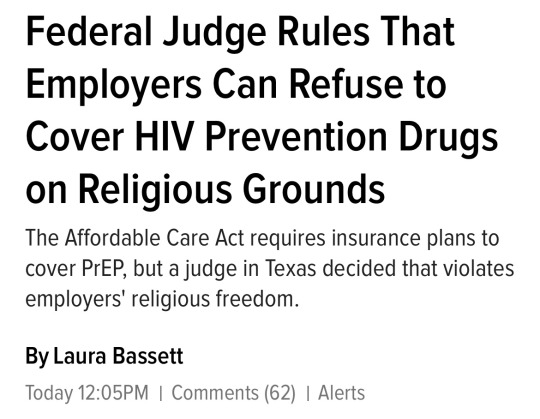

Source
#health#health care#hiv/aids#private health care#government#us politics#the left#current event#news#lgbtq#prep#medicare for all#twitter post#progressive
997 notes
·
View notes
Text
Love (cannot emphasis how much sarcasm there is in that word) that an official Canadian government response to high cellphone rates is to switch carriers.
Switch it to what? We basically have three companies since one was allowed to eat the forth (with the government saying it wasn't anti-competition and the company eating the other pinky promising they wouldn't jack rates up). Even the smaller companies have to rent infrastructure from the Big Three so there's only so much they can do if that rent costs an arm and a leg.
And that's not touching on how many "small companies" are actually just subsidiaries of the Big Three. You may save $5 but you're still with Telus/Rogers/Bell.
Or that the actual small companies tend to have shit coverage because they don't have the infrastructure available to them and are prevented from getting it. Or their traffic is throttled in favour of the Big Three's customers. Or both.
Or that they're extremely regional thus aren't an option for a huge chunk of Canada's population.
We have no true options and the government has shown time and again that they're fine with monopolies, in multiple industries, and don't care when said monopolies jack up prices to make shareholders and the c-suite more money at the expense of everyone else. At most there will be a verbal slap on the wrist and a giftcard for $25 that people have to register for, for a decade and a half of price gouging.
It's not talked a whole lot about outside the country from what I've seen and heard but Canada is a country of monopolies. A handful of companies own nearly everything, every province has a family or two that owns a hell of a lot (Nova Scotia is basically owned by one family at this point), and our government ignores it. Even the branch that is supposed to be against monopolies is fine with mergers and takeovers in most cases.
Because, you know, the company said it totally wouldn't use consumers' lack of options to increase prices.
#canada#so much of our infrastructure and critical construction such as housing#has been pawned off for decades to private companies#and i forgot to mention one (1) family owns the bridge that is a major international corridor between canada and the us#which is apparently fine even though they fought tooth and nail to stop a bridge they don't own from being built#like our housing crisis can be traced back to the government deciding to stop building public housing in the 90s#because they figured private developers would pick up the slack#affordable apartments don't bring in much money so we got decades of cheap-ass 'luxury condos' instead#and once airbnb became a thing we got entire buildings with units <300sqft#and of course when the party in charge rotates between conservatives and neolibs nothing changes and that can gets kicked down the road#and keeps getting kicked until something collapses and they see the chance to fully privatize an industry#something similar is happening to our healthcare system too#it has been left to languish for years/decades with funding freezes and cuts#and private companies are quick to jump in and get the government stamp of approval to do [thing] that the public system clearly can't do#when [thing] would absolutely be possible if it was actually funded and/or staffed#so many communities were cut off when greyhound closed up shop because there's no government inter-city transportation#we lost internet/banking/cell service/etc nation-wide because one of the big three decided to push an update to live without redundancies#and it bugged and took the entire company's network down#even the government agency that demands major companies have a backup on a different network was taken down because they ignored that#and they got a deal if they kept their backup with rogers while their main network was also rogers#so they couldn't even make an emergency statement or anything about it#half my province also lost all digital infrastructure because it's a private company and making a redundancy line would mean smaller bonuse#it's just so bad#joke all you want about how canada is nice and friendly#but you are wrong and it's hell if you actually live here#the only reason canada is seen as nice is because it's hard to not seem like the better option when the us is your neighbour#and because of decades of pr work to make canada seem friendly and nice and not at all problematic#in some countries you actually have to try to hide you're canadian because of how much we colonize and the damage we do to other countries#yes these tags have derailed from the post but ugh#i take major issue with people who insist canada is nice and has never done anything wrong
62 notes
·
View notes
Text


classic reaction to private school bullshit
#dimension 20#brennan lee mulligan#fantasy high junior year#fh junior year#fhjy#siobhan thompson#emily axford#d20 fhjy#zac oyama#adaine abernant#YEAH#I go to private university (really prestigious with a bunch of rich kids) and YEAH#they don’t hit us but like man I filed a departament of Justice complaint WITH THE FEDERAL GOVERNMENT#by midterms first semester
56 notes
·
View notes
Note
Re the rabid skunk
I’m from a country town and while it’s not something I was taught in school, I was definitely taught by my parents and other adults in my life to report possibly rabid or sick animals. There is some worry about rabies and other diseases diseases rising in the wildlife population so the forest service try to stay on top of it.
It’s a little messed up that no one was taking your concern seriously. Even if it was just a weird skunk, rabies and other animal diseases are no joke and pose a threat to people and other animals.
Thank you! It's very...idk the word. Affirming? Good to know it's not just me that thinks it's like a responsibility to report potentially rabid animals, like it's just a thing you do
#ask away!#for anyone who missed my post about this yesterday#there was a skunk in my yard behaving very weird yesterday#out in bright daylight running full speed in a giant circle not being chased not looking for food#found a hiding place (under the shed in my yard) but did not stay there#came from the center of the neighborhood (away from forest not good for skunks)#ran towards forest then veered away back towards houses#so I tried to call to report the skunk to animal control in case it was rabies (or another potentially zoonotic disease)#and there just! is no animal control! where I live!#absolutely no governmental involvement AT ALL#and the private companies only handle stray pets not wildlife!#which is wild to me#what is government for if not to try to control rabies#like I understand that is not the central purpose of government but I do feel like it should at least be on the radar
38 notes
·
View notes
Text
🐦 Afternoon Update: Idiot Unplugs Things
How foolish of me, to think that the frenetic pace of things would somehow slow down. If you haven’t already backed up your account/data at Twitter. Um. You should. If that is indeed still functioning behind the scenes.
Because like, apparently the moment I hit post this morning, our local genius who wants to start a colony on Mars, who knows all things in the universe, does what any smart person would do, made this announcement.
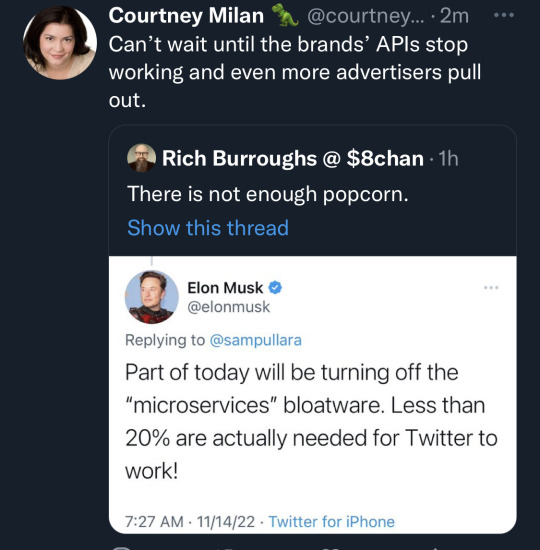

Just randomly turning off shit. Because really, what does any of this stuff do anyway? People were just writing lines of codes and services to waste time and money. And of course, as a born genius who has all of the world’s knowledge constantly uploaded into his head at all times, knows how things work:




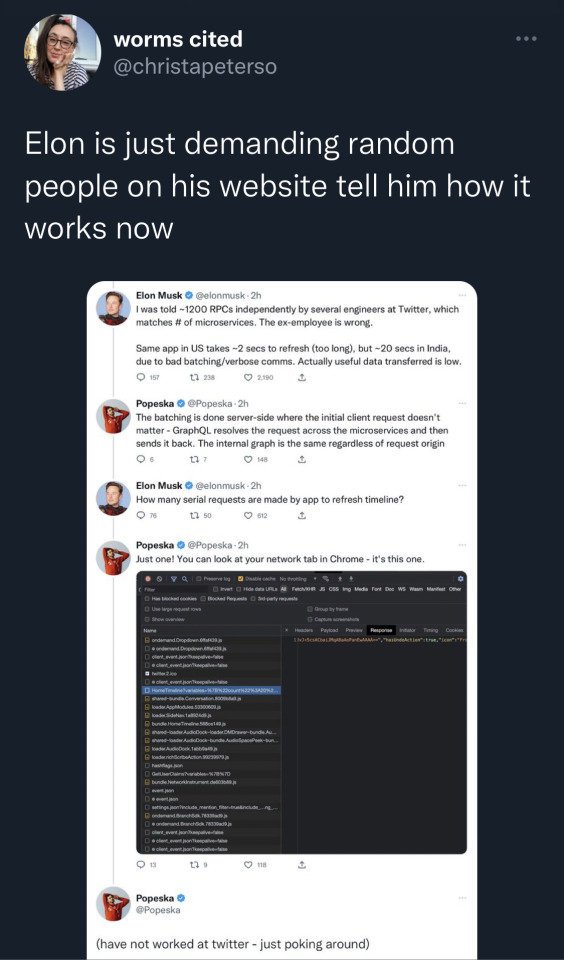
So anyway, enough about breaking things on the biggest mobile platform in the world, what does all those stupid services that Twitter doesn’t even NEED to work do?
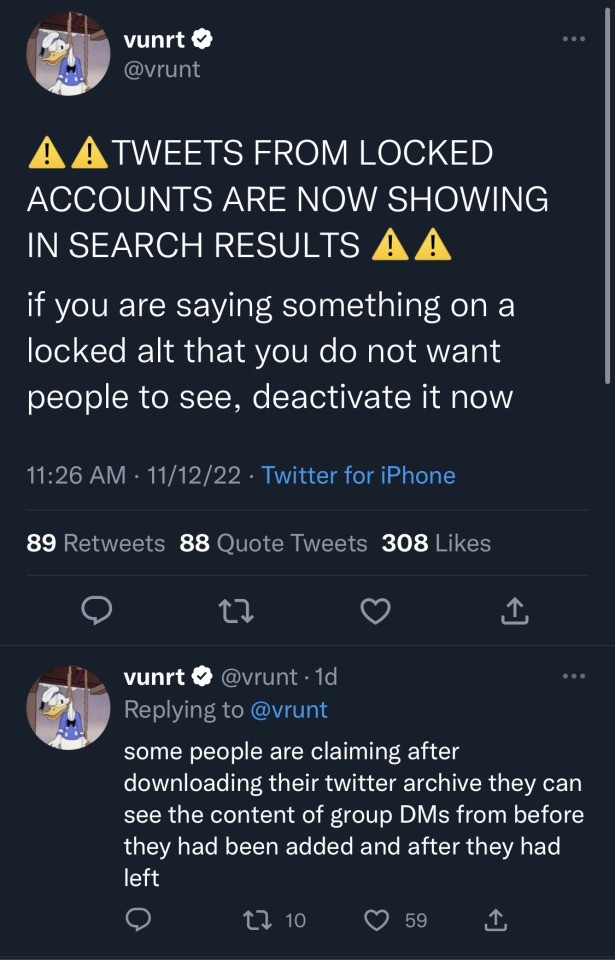
Oh. Oh.
Well fuck it. It’s just privacy settings. Those aren’t CORE FUNCTIONALITY baby.
I mean. Technically you can still tweet right. It’s not like you need any of those services to actually get into your account to tweet—
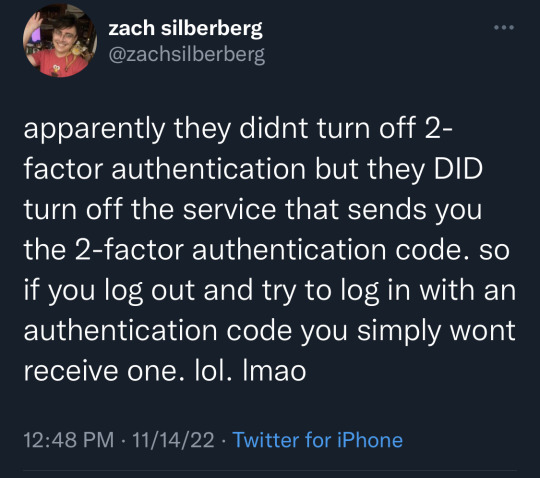
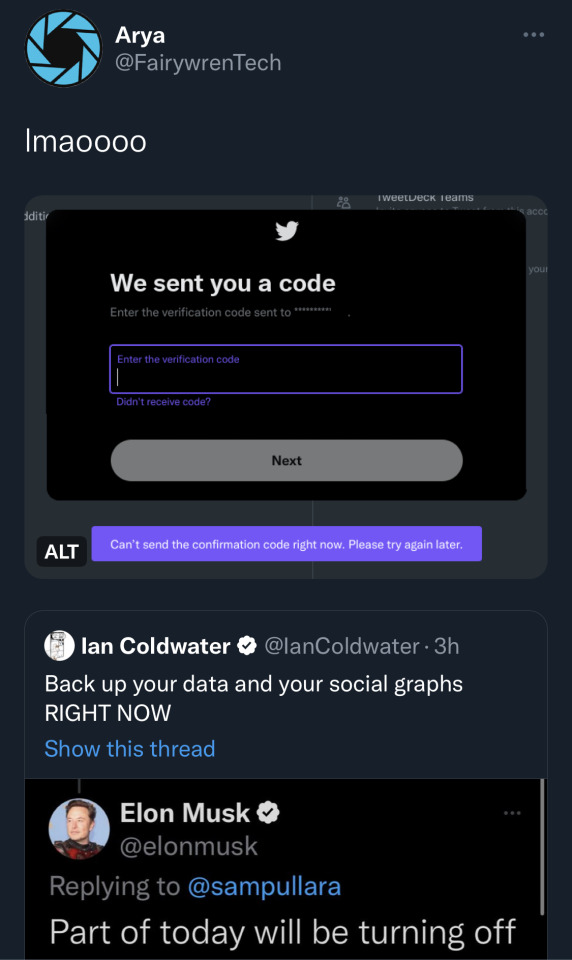
In summary: IT’S GOING GREAT.
#twitterpocalypse#anyone actually still employed at this place#that worked there pre-musk#deserves to have drinks bought for them today#I’M SO GLAD GOVERNMENT AGENCIES DON’T USE THIS SERVICE OR ANYTHING#the thing about the private tweets showing up in public was called into question#but the more i looked into it it actually does seem genuine#the lights are technically still on over there#so it’s not dead YET
423 notes
·
View notes
Text
the fact that he threatens them and it doesn't do anything... all the money, lawyers and connections couldn't help him. once the magnus institute learned about him, he was never going to be safe again.
#also#private actors can't just imprison people#you need governments help for that#the magnus protocol#tmp#txt
21 notes
·
View notes